Related Research Articles

Bruno Walter was a German-born conductor, pianist, and composer. Born in Berlin, he escaped Nazi Germany in 1933, was naturalised as a French citizen in 1938, and settled in the United States in 1939. He worked closely with Gustav Mahler, whose music he helped to establish in the repertory, held major positions with the Leipzig Gewandhaus Orchestra, New York Philharmonic, Concertgebouw Orchestra, Salzburg Festival, Vienna State Opera, Bavarian State Opera, Staatsoper Unter den Linden and Deutsche Oper Berlin, among others, made recordings of historical and artistic significance, and is widely considered to be one of the great conductors of the 20th century.

Louis Spohr, baptized Ludewig Spohr, later often in the modern German form of the name Ludwig was a German composer, violinist and conductor.
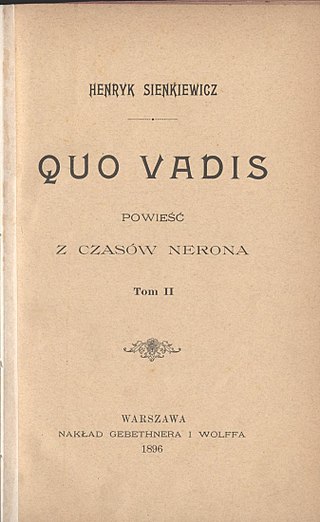
Quo Vadis: A Narrative of the Time of Nero is a historical novel written by Henryk Sienkiewicz in Polish.
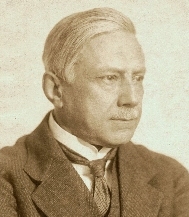
Emil Nikolaus Joseph, Freiherr von Reznicek was an Austrian composer of Romanian-Czech ancestry.
Quo vadis? is a Latin phrase meaning "Where are you going?".
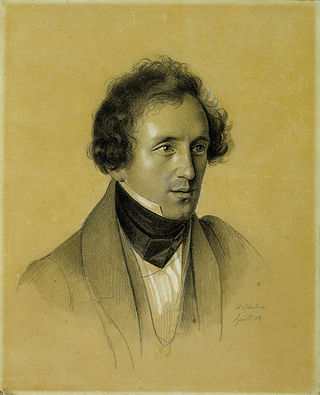
St. Paul, Op. 36, is an oratorio by Felix Mendelssohn. The composer oversaw versions and performances in both German and English within months of completing the music in early 1836.
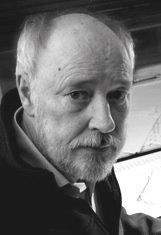
Anders Erik Birger Eliasson was a Swedish composer.
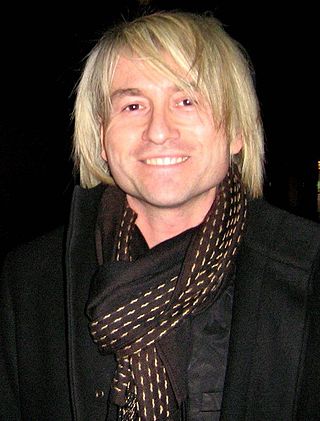
Piotr Rubik is a Polish composer of symphonic pop music for orchestra, film and theatre as well as conductor, music producer and vocalist. He gained nationwide popularity in the mid-2000s with the success of his songs Niech mówią, że to nie jest miłość (2005) and Psalm dla Ciebie (2006).

Feliks Nowowiejski was a Polish composer, conductor, concert organist, and music teacher. Nowowiejski was born in Wartenburg in Warmia in the Prussian Partition of Poland. He died in Poznań, Poland.
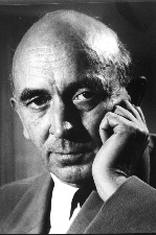
Ernst Pepping was a German composer of classical music and academic teacher. He is regarded as an important composer of Protestant sacred music in the 20th century.

Richard Wetz was a German late Romantic composer best known for his three symphonies. In these works, he "seems to have aimed to be an immediate continuation of Bruckner, as a result of which he actually ended up on the margin of music history".
Benjamin-Gunnar Cohrs was a German conductor, music scholar, and publicist on music.
Michail Vladimirovich Jurowski was a Russian conductor who worked internationally, based in Germany for most of his career. He was particularly interested in the works of Dmitri Shostakovich, in concerts and recordings.

Das Floß der Medusa is a 1967 secular oratorio by the German composer Hans Werner Henze. It is regarded as a seminal work in the composer's alignment with left-wing politics.

Joseph Beer was a composer who worked mainly in the genres of operettas, singspiele, and operas.
Joanna Kozłowska-Szczepaniak is a Polish opera singer (soprano).

The Feliks Nowowiejski Academy of Music is a Polish state music university located in downtown Bydgoszcz. Its origins date back to 1974, as branch of the Music College in Łódź until 1979. At that point it was established as independent Bydgoszcz State College of Music, consisting of four departments. The current name was adopted in 1981.
Lithuanian Rhapsody in A minor, Op. 11 is the third of Mieczysław Karłowicz's six symphonic poems. A typical performance lasts 18—20 minutes.
Sinfonia Sacra is the third symphony by the Polish composer, Andrzej Panufnik. It was written in 1963 to mark Poland’s millennium of Christianity and Statehood in 1966. Panufnik intended the work as an expression of his religious and patriotic feelings. He based the symphony on the first known hymn in Polish, the Bogurodzica plainchant.

Rafał Siwek is a Polish opera singer (bass).
References
- ↑ Sukces „Quo Vadis” w Berlinie - rok Feliksa Nowowiejskiego i Henryka Sienkiewicza
- ↑ Klassische Konzerte BERLIN - BRESLAU: Oratorium QUO VADIS von Felix Nowowiejski "In den Zwanziger und Dreißiger Jahren des 20. Jahrhunderts erfreute sich QUO VADIS einer sehr großen Popularität. Das Werk wurde in den berühmtesten Konzerthäusern in Europa, Nord- und Südamerika mehr als 200 mal gespielt, bevor es in der Zeit danach beinahe in Vergessenheit geraten wäre."
- ↑ Nowowiejskis Oratorium "Quo Vadis" So klingt es, wenn Rom brennt - Aufzeichnung aus Poznań
- ↑ Review - no libretto